外研社八年级英语(下册)辅导资料Module
- 格式:doc
- 大小:60.00 KB
- 文档页数:6
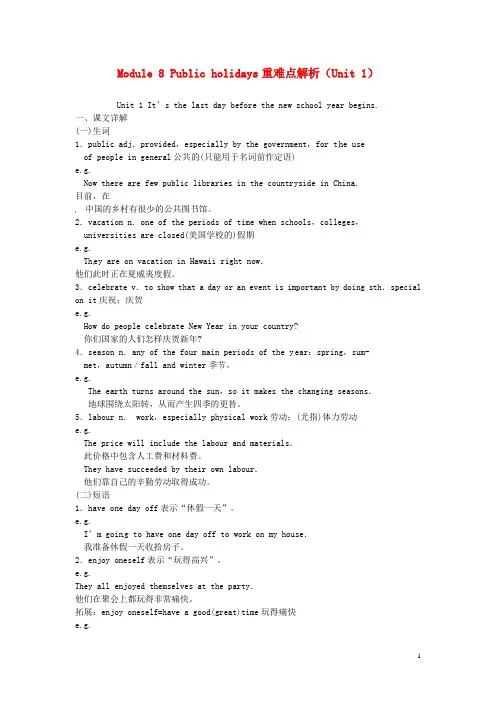
Module 8 Public holidays重难点解析(Unit 1)Unit 1 It’s the last day before the new school year begins.一、课文详解(一)生词1.public adj.provided,especially by the government,for t he useof people in general公共的(只能用于名词前作定语)e.g.Now there are few public libraries in the countryside in China.目前,在中国的乡村有很少的公共图书馆。
2.vacation n.one of the periods of time when schools,colleges,universities are closed(美国学校的)假期e.g.Th ey are on vacation in Hawaii right now.他们此时正在夏威夷度假。
3.celebrate v.to show that a day or an event is important by doing sth.special on it庆祝;庆贺e.g.How do people celebrate New Year in your country?你们国家的人们怎样庆贺新年?4.season n.any of the four main periods of the y ear:spring,sum-met,autumn/fall and winter季节。
e.g.The earth turns around the sun,so it makes the changing seasons.地球围绕太阳转,从而产生四季的更替。
5.labour n. work,especially physical work劳动;(尤指)体力劳动e.g.The price will include the labour and materials.此价格中包含人工费和材料费。
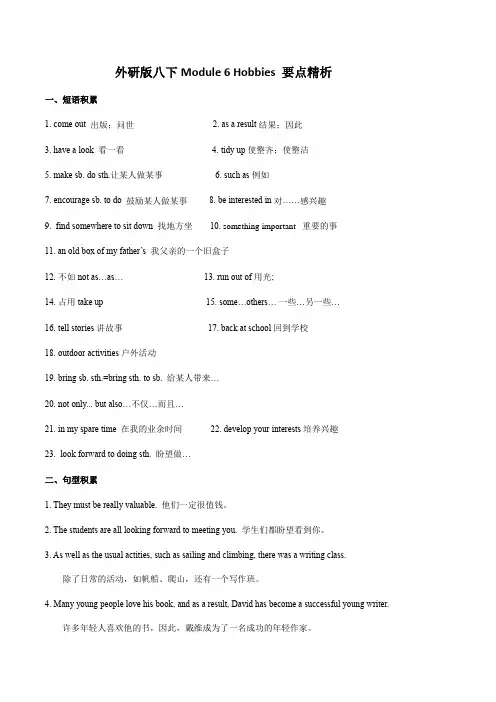
外研版八下Module 6 Hobbies 要点精析一、短语积累1. come out 出版;问世2. as a result结果;因此3. have a look 看一看4. tidy up使整齐;使整洁5. make sb. do sth.让某人做某事6. such as例如7. encourage sb. to do 鼓励某人做某事8. be interested in对……感兴趣9.find somewhere to sit down 找地方坐10. something important 重要的事11.an old box of my father’s 我父亲的一个旧盒子12.不如not as…as…13.run out of用光;14.占用take up15.some…others…一些…另一些…16.tell stories讲故事17.back at school回到学校18.outdoor activities户外活动19.bring sb.sth.=bring sth.to sb. 给某人带来…20.not only...but also…不仅…而且…21.in my spare time 在我的业余时间22.develop your interests培养兴趣23.look forward to doing sth. 盼望做…二、句型积累1. They must be really valuable. 他们一定很值钱。
2. The students are all looking forward to meeting you. 学生们都盼望看到你。
3. As well as the usual actities, such as sailing and climbing, there was a writing class.除了日常的活动,如帆船、爬山,还有一个写作班。
4. Many young people love his book, and as a result, David has become a successful young writer.许多年轻人喜欢他的书,因此,戴维成为了一名成功的年轻作家。
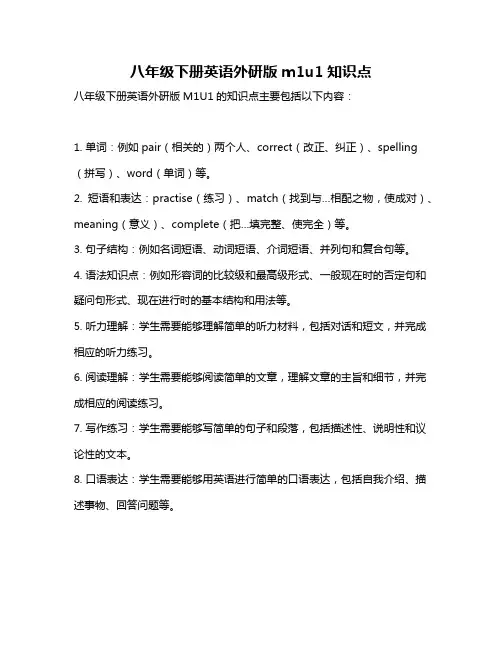
八年级下册英语外研版m1u1知识点
八年级下册英语外研版M1U1的知识点主要包括以下内容:
1. 单词:例如pair(相关的)两个人、correct(改正、纠正)、spelling (拼写)、word(单词)等。
2. 短语和表达:practise(练习)、match(找到与…相配之物,使成对)、meaning(意义)、complete(把…填完整、使完全)等。
3. 句子结构:例如名词短语、动词短语、介词短语、并列句和复合句等。
4. 语法知识点:例如形容词的比较级和最高级形式、一般现在时的否定句和疑问句形式、现在进行时的基本结构和用法等。
5. 听力理解:学生需要能够理解简单的听力材料,包括对话和短文,并完成相应的听力练习。
6. 阅读理解:学生需要能够阅读简单的文章,理解文章的主旨和细节,并完成相应的阅读练习。
7. 写作练习:学生需要能够写简单的句子和段落,包括描述性、说明性和议论性的文本。
8. 口语表达:学生需要能够用英语进行简单的口语表达,包括自我介绍、描述事物、回答问题等。
以上是八年级下册英语外研版M1U1的主要知识点,学生需要掌握这些知识点,并能够在实际生活中运用英语进行交流。
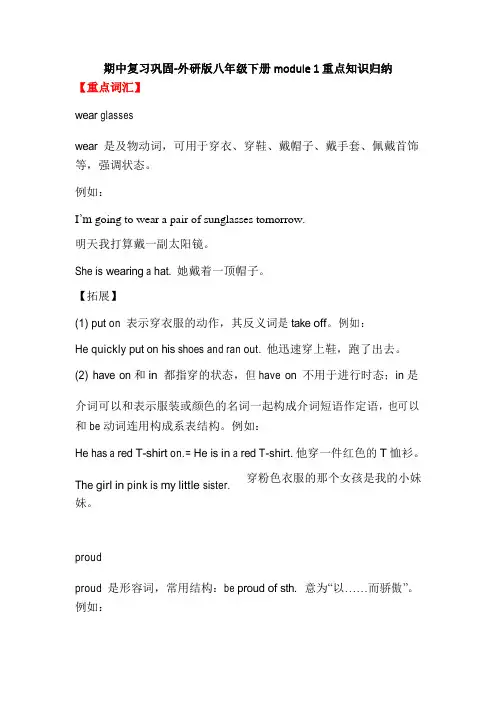
期中复习巩固-外研版八年级下册module1重点知识归纳【重点词汇】wear glasseswear是及物动词,可用于穿衣、穿鞋、戴帽子、戴手套、佩戴首饰等,强调状态。
例如:I’m going to wear a pair of sunglasses tomorrow.明天我打算戴一副太阳镜。
She is wearing a hat.她戴着一顶帽子。
【拓展】(1)put on表示穿衣服的动作,其反义词是take off。
例如:He quickly put on his shoes and ran out.他迅速穿上鞋,跑了出去。
(2)have on和in 都指穿的状态,但have on不用于进行时态;in是介词可以和表示服装或颜色的名词一起构成介词短语作定语,也可以和be动词连用构成系表结构。
例如:He has a red T-shirt on.=He is in a red T-shirt.他穿一件红色的T恤衫。
穿粉色衣服的那个女孩是我的小妹The girl in pink is my little sister.妹。
proudproud是形容词,常用结构:be proud of sth.意为“以……而骄傲”。
例如:I am very proud of being a Chinese.作为一名中国人我很自豪。
be proud to do sth意为“为做某事而骄傲”。
例如:We are proud to be a league member.我们为成为团员而骄傲。
【拓展】pride是名词,意为“骄傲,自豪”。
常用的结构:take pride in sth.意为“为某事骄傲”。
例如:They take great pride in her daughter who is now a famous scientist.他们为成为科学家的女儿而感到自豪。
He is the pride of our city.他是我们城市的骄傲。
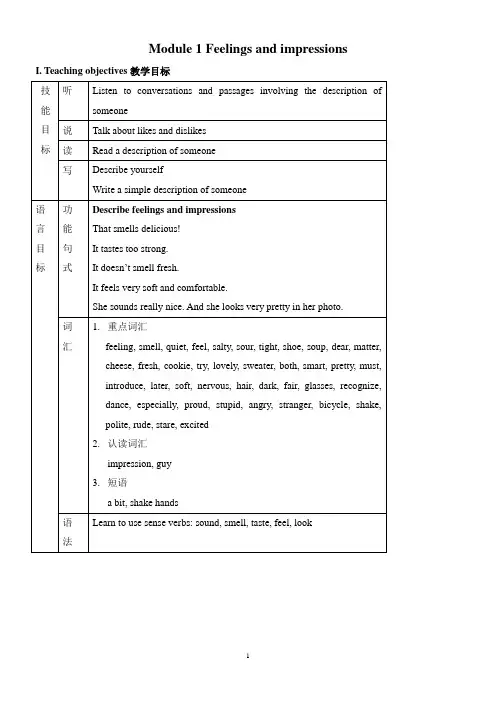
Module 1 Feelings and impressions I. Teaching objectives教学目标II. Teaching materials analyzing 教材分析本模块的主题是“Feelings and i mpressions”, 教材的设置将功能与结构融于话题与任务中,通过话题的循环与任务的完成学习感官动词的用法及系表结构。
Unit 1主要目标是学习感官动词,通过听读呈现了感官动词的功能,运用说写任务循环训练,强化语言知识。
活动1要求听句子,给图片标号,训练学生捕捉主要信息及所需信息的能力。
活动2要求将所给句子与图片配对,为学习对话做准备。
活动3听读谈论“感觉和印象”的对话,培养学生领会主旨大意的听力技巧,呈现新的语言内容。
活动4要求回答问题,进一步熟悉对话内容,掌握感官动词的用法。
活动5要求完成句子,巩固感官动词及描述性形容词的用法。
活动6 的完成可帮助进一步辨认不同感官动词与相应感觉器官的对应。
活动7和8 是对本单元语音语调规则的训练及实践运用。
Unit 2 主要目标是学习运用系表结构描述人的外表,初步认识并使用when 引导的时间状语从句。
活动1是热身活动,为阅读部分做了句式结构及词汇上的准备。
要求学生运用所给词汇谈论图片中人物形象。
活动2 是Sally写给其笔友Lingling的一封信,要求学生读后根据信中描述找出正确的图片。
活动3要求将所给问句与相应段落配对,考查学生把握段落大意的能力。
活动4要求学生仿照信件中Sally对自己外表的描述,描述照片中人物的形象。
活动5和6 要求以回答问题和两人对话的形式,运用when 引导的时间状语从句谈论别人及自己的感受。
活动7要求按照提示给Sally写一封回信介绍自己的情况:外貌、喜好等。
Unit 3 主要是语言应用。
活动1 要求小组活动说出自己的好恶及理由,巩固感官动词的用法。
活动2和3 要求用感官动词填空,完成句子。
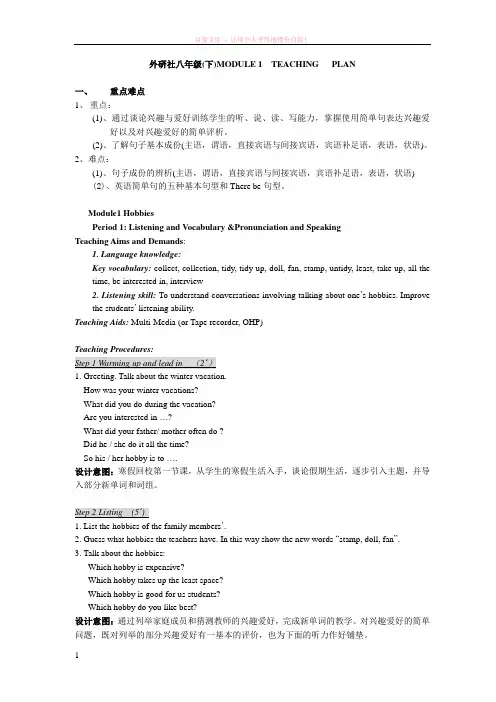
外研社八年级(下)MODULE 1 TEACHING PLAN一、重点难点1、重点:(1)、通过谈论兴趣与爱好训练学生的听、说、读、写能力,掌握使用简单句表达兴趣爱好以及对兴趣爱好的简单评析。
(2)、了解句子基本成份(主语,谓语,直接宾语与间接宾语,宾语补足语,表语,状语)。
2、难点:(1)、句子成份的辨析(主语,谓语,直接宾语与间接宾语,宾语补足语,表语,状语)(2)、英语简单句的五种基本句型和There be句型。
Module1 HobbiesPeriod 1: Listening and Vocabulary &Pronunciation and SpeakingTeaching Aims and Demands:1. Language knowledge:Key vocabulary: collect, collection, tidy, tidy up, doll, fan, stamp, untidy, least, take up, all the time, be interested in, interview2. Listening skill: To understand conversations involving talking about one’s hobbies. Improvethe students’ listening ability.Teaching Aids: Multi-Media (or Tape recorder, OHP)Teaching Procedures:Step 1 Warming up and lead in (2’)1. Greeting. Talk about the winter vacation.How was your winter vacations?What did you do during the vacation?Are you interested in …?What did your father/ mother often do ?Did he / she do it all the time?So his / her hobby is to ….设计意图:寒假回校第一节课,从学生的寒假生活入手,谈论假期生活,逐步引入主题,并导入部分新单词和词组。

一、单词1. hardly adv.几乎不;几乎没2. take up占去(时间或空间)3. point out指出;指明4. sights n.风景;名胜(用复数)5. thirsty adj.渴的6. at the top of在……的顶端7. waste v.浪费;滥用n.浪费;滥用8. square adj.平方的(表示面积单位)9. kilometre n.千米;公里10. shape n.外形;形状11. human n.人12. wake v.唤醒;醒来(woke ,woken)13. wake sb. up唤醒某人14. somebody pron.某人;有人15. about adv.向四周;向各处16. path n.小路;路径17. pull v.拉,牵,扯(用手)18. freshwater adj.淡水的Spring comes二、词性转换1. hardly adv. 几乎不;几乎没→ hard adv.努力地adj.艰难的;困难的2. take up占去(时间或空间)→ take it/them up代词放中间3. thirsty adj.渴的→ hungry adj.饥饿的4. kilometre n.千米;公里→ pl.(kilometers)5. shape n.外形;形状→ pl.(shapes )6. human n.人→pl.(humans)7. wake v.唤醒,醒来,失去→第三人称单数(wakes)→现在分词(waking)→过去时(woke)→过去分词(woken)8. somebody pron.某人;有人→anybody pron. 任何人→nobody pron. 没有人9. path n. 小路;路径→pl. (paths)10. pull v.(用手)拉,牵,扯→第三人称单数(pulls)→现在分词(pulling)→过去时(pulled)→过去分词(pulled)11. waste v.浪费;滥用n.浪费;滥用→adj. wasteful 浪费的三、单词默写Part11. adv. 几乎不;几乎没______2. 占去(时间或空间)______3. 指出;指明______4. n.(用复数)风景; 名胜______5. adj.渴的______6. 在…的顶端______7. v.浪费; 滥用n.浪费; 滥用______8. adj. (表示面积单位) 平方的______9. n.千米;公里______10. n.外形;形状______Part 211. n.人______12. v.唤醒;醒来______13. 唤醒某人______14. pron.某人;有人______15. adv.向四周; 向各处______16. n.小路;路径______17. (用手)拉,牵,扯______18. adj.淡水的______四、重点短语1. hear about 听说2. Welcome to sp. 欢迎回到某地3. so that 如此…以至于4. be famous for以…而闻名5. take up 占去(时间或空间)6. ancient bridges 古老的桥7. walk along the lake 沿着湖走8. cross the bridge 穿过桥9. climb the hill 爬上山10. point out 指出;指明11. good idea 好主意12. go for a swim 游泳13. allow sb. to do sth. 允许某人做某事14. That’s too bad. 那太槽糕了15. at the top of 在…的顶端16. come on来吧;加油17. promise to do sth. 承诺做某事18. have a wonderful time 玩得高兴19. by a small lake 在一个小湖边20. last night昨晚21. during the night 在夜间22. wake sb. up 唤醒某人23. move about四处移动24. make some noise 制造造影25. look for 寻找26. hope to do sth. 希望做某事27. It was a pity that…多么可惜28. Pull…off从…上扯…29. be back home 回家30. the second-largest freshwater lake第二大淡水湖盛开的地方在那花儿五、重点句型1. Here we are. 我们到了。
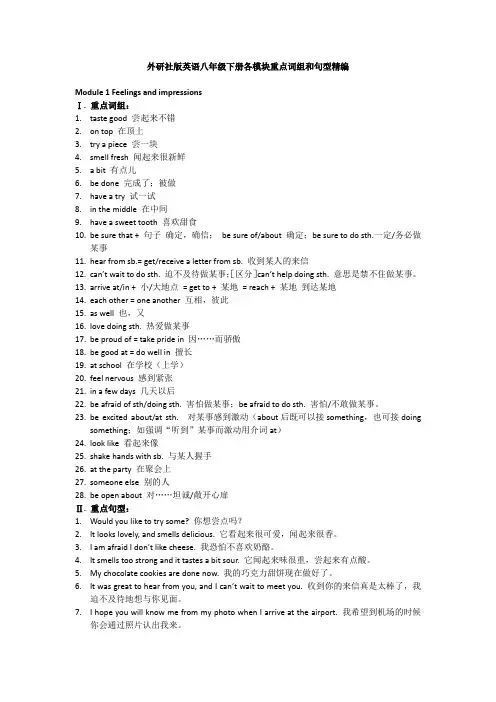
外研社版英语八年级下册各模块重点词组和句型精编Module 1 Feelings and impressionsⅠ. 重点词组:1.taste good 尝起来不错2.on top 在顶上3.try a piece 尝一块4.smell fresh 闻起来很新鲜5. a bit 有点儿6.be done 完成了;被做7.have a try 试一试8.in the middle 在中间9.have a sweet tooth 喜欢甜食10.be sure that + 句子确定,确信;be sure of/about 确定;be sure to do sth.一定/务必做某事11.hear from sb.= get/receive a letter from sb. 收到某人的来信12.c an’t wait to do sth. 迫不及待做某事;[区分]can’t help doing sth. 意思是禁不住做某事。
13.arrive at/in + 小/大地点= get to + 某地= reach + 某地到达某地14.each other = one another 互相,彼此15.as well 也,又16.love doing sth. 热爱做某事17.be proud of = take pride in 因……而骄傲18.be good at = do well in 擅长19.at school 在学校(上学)20.feel nervous 感到紧张21.in a few days 几天以后22.be afraid of sth/doing sth. 害怕做某事;be afraid to do sth. 害怕/不敢做某事。
23.be excited about/at sth. 对某事感到激动(about后既可以接something,也可接doingsomething;如强调“听到”某事而激动用介词at)24.look like 看起来像25.shake hands with sb. 与某人握手26.at the party 在聚会上27.someone else 别的人28.be open about 对……坦诚/敞开心扉Ⅱ. 重点句型:1.Would you like to try some? 你想尝点吗?2.It looks lovely, and smells delicious. 它看起来很可爱,闻起来很香。
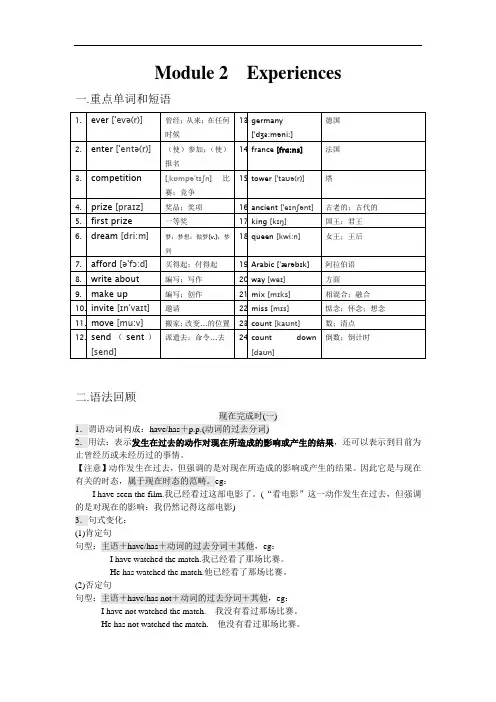
Module 2 Experiences一.重点单词和短语二.语法回顾现在完成时(一)1.谓语动词构成:have/has+p.p.(动词的过去分词)2.用法:表示发生在过去的动作对现在所造成的影响或产生的结果,还可以表示到目前为止曾经历或未经历过的事情。
【注意】动作发生在过去,但强调的是对现在所造成的影响或产生的结果。
因此它是与现在有关的时态,属于现在时态的范畴。
eg:I have seen the film.我已经看过这部电影了。
(“看电影”这一动作发生在过去,但强调的是对现在的影响:我仍然记得这部电影)3.句式变化:(1)肯定句句型:主语+have/has+动词的过去分词+其他,eg:I have watched the match.我已经看了那场比赛。
He has watched the match.他已经看了那场比赛。
(2)否定句句型:主语+have/has not+动词的过去分词+其他,eg:I have not watched the match.我没有看过那场比赛。
He has not watched the match.他没有看过那场比赛。
(3)一般疑问句句型:Have/Has+主语+动词的过去分词+其他?肯定回答:Yes,主语+have/has.否定回答:No,主语+haven't/hasn't. eg:—Have you watched the match?你看那场比赛了吗?—Yes,I have./No,I haven't.是的,我看了。
/不,我没看。
—Has he watched the match?他看那场比赛了吗?—Yes,he has./No,he hasn't.是的,他看了。
/不,他没看。
4.动词过去分词的构成:(1)规则动词①大多数动词直接在后面加-ed。
work →worked cook →cooked②以e结尾的动词需加-d。
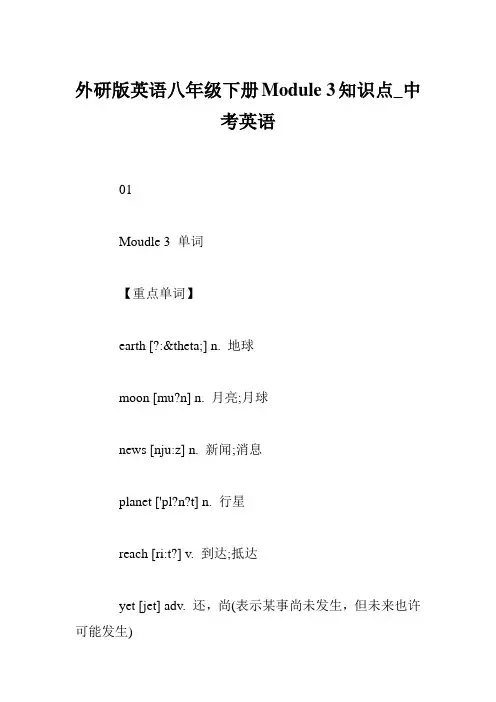
外研版英语八年级下册Module 3知识点_中考英语01Moudle 3 单词【重点单词】earth [?:θ] n. 地球moon [mu?n] n. 月亮;月球news [nju:z] n. 新闻;消息planet ['pl?n?t] n. 行星reach [ri:t?] v. 到达;抵达yet [jet] adv. 还,尚(表示某事尚未发生,但未来也许可能发生)just [d??st] adv. 刚才;刚刚model ['m?dl] n. 模型spaceship [?spe?s??p] n. 航天器;宇宙飞船project [pr??d?ekt] n. 计划;工程;项目no problem [?pr?bl?m] 没问题(用于表示乐于做某人要求做的事)latest [?le?t?st] adj. 最近的;最新的on [?n] prep. 在(播放)中;关于...discover [d?'sk?v?(r)] v. 发现;找到astronaut [??str?n?:t] n. 宇航员space travel [spe?s] [?tr?vl] 航天旅行none [n?n] prop. 没有一人;没有一个environment [?n'va?r?nm?nt] n. 环境that [e?t] pron. 那;那个(前面已提及的事物)solar ['s??l?(r)] adj. 太阳的;与太阳有关的system ['s?st?m] n. 系统;体系solar system 星系;(尢指)太阳系group [ɡru:p] n. 群;组galaxy ['ɡ?l?ks?] n. 星系universe [?ju:n?v?:s] n. 宇宙light [la?t] n. 光线;光亮impossible [?m?p?s?bl] adj. (事情)办不到的,不可能的out [a?t] adv. 在远方communicate [k?'mju:n?ke?t] v. 联系;交流02Moudle 3 知识梳理【重点短语】1. What are you up to? 你在干什么?2. the latest news 最新消息3. get information 获得信息4. search for 寻找,搜索5. in order to 为了6. much+比较级...得多7. on earth 在世界上,在人间,究竟,到底8. communicate with sb 与某人交流9. hundreds of 数以百计的10. go around 绕着......走11. billions of 数十亿的12. take photos 拍照13. send...to... 把...送到...14. no problem 没问题15. be far away(from) 离...远16. go online 上网17. search for 搜索18. more than 超过;多余19. look for 寻找20. look like 看起来像21. finish doing sth 做完某事22.no problem 没问题23.space travel 航天旅行24.none of them 没有一个25.have an environment of有..的环境26.solar system 星系;尤指太阳系27.It's (im)possible to do sth 去做这件事是(不)可能的municate with sb 和某人联系29.be up to do sth 忙于做某事30.make a spaceship 制作一个航天器模型【单词考点】Earth n.?地球?【经典例句】The Earth goes round the sun once a year.?地球一年绕太阳一周。
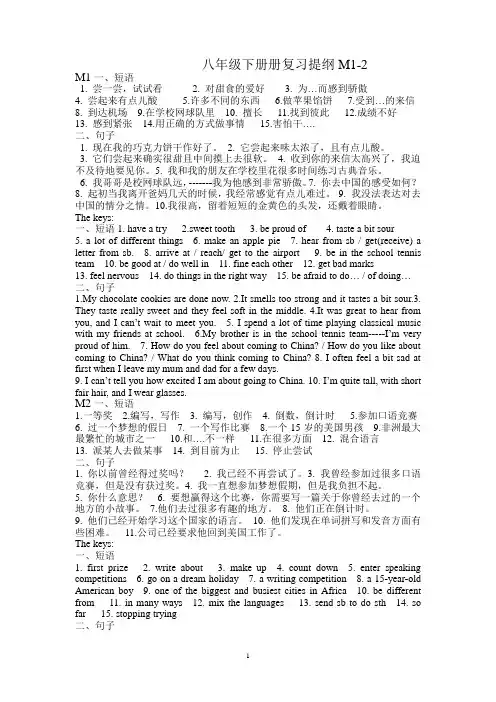
八年级下册册复习提纲M1-2M1一、短语1. 尝一尝,试试看2. 对甜食的爱好3. 为…而感到骄傲4. 尝起来有点儿酸5.许多不同的东西6.做苹果馅饼7.受到…的来信8. 到达机场9.在学校网球队里10. 擅长11.找到彼此12.成绩不好13. 感到紧张14.用正确的方式做事情15.害怕干….二、句子1. 现在我的巧克力饼干作好了。
2. 它尝起来味太浓了,且有点儿酸。
3. 它们尝起来确实很甜且中间摸上去很软。
4. 收到你的来信太高兴了,我迫不及待地要见你。
5. 我和我的朋友在学校里花很多时间练习古典音乐。
6. 我哥哥是校网球队远,-------我为他感到非常骄傲。
7. 你去中国的感受如何?8. 起初当我离开爸妈几天的时候,我经常感觉有点儿难过。
9. 我没法表达对去中国的情分之情。
10.我很高,留着短短的金黄色的头发,还戴着眼睛。
The keys:一、短语1. have a try 2.sweet tooth 3. be proud of 4. taste a bit sour5. a lot of different things6. make an apple pie7. hear from sb / get(receive) a letter from sb.8. arrive at / reach/ get to the airport9. be in the school tennis team 10. be good at / do well in 11. fine each other 12. get bad marks13. feel nervous 14. do things in the right way 15. be afraid to do… / of doing…二、句子1.My chocolate cookies are done now.2.It smells too strong and it tastes a bit sour.3. They taste really sweet and they feel soft in the middle.4.It was great to hear from you, and I can’t wait to meet you.5. I spend a lot of time playing classical music with my friends at school.6.My brother is in the school tennis team-----I’m very proud of him.7. How do you feel about coming to China? / How do you like about coming to China? / What do you think coming to China?8. I often feel a bit sad at first when I leave my mum and dad for a few days.9. I can’t tell you how excited I am about going to China. 10. I’m quite tall, with short fair hair, and I wear glasses.M2一、短语1.一等奖2.编写,写作3. 编写,创作4. 倒数,倒计时5.参加口语竞赛6. 过一个梦想的假日7. 一个写作比赛8.一个15岁的美国男孩9.非洲最大最繁忙的城市之一10.和….不一样11.在很多方面12. 混合语言13. 派某人去做某事14. 到目前为止15. 停止尝试二、句子1. 你以前曾经得过奖吗?2. 我已经不再尝试了。
Module 10 On the radio 重点短语1. on air (广播,电视)播出2. show sb around 带领某人参观3. avoid making any noise 避免制造任何噪音4. keep doing 一直做某事5. keep quiet 保持安静6. do interviews 做采访7. more and more 越来越多8. look down 向下看9. sit close to the radio 坐在收音机旁10. ask for jobs 找工作11. ask for... 请求...12. at the age of... 在......岁时13. in person 亲自;本人14. once a week 一周一次15. an electronic dictionary 一个电子词典16. have picnic 野餐17. close down 关闭18. do research on 做......研究19. the end of ...的结尾20. in my free time 在我的空闲时间21. weather report 气象预报22. come this way 这边请23. learn about 了解语法总结:1. Thank you for showing us around. 谢谢带我们参观thank you for doing sth 谢谢做某事show sb around 带某人参观2. We should avoid making any noise in the backgroud.avoid doing sth 避免做某事We should avoid making mistakes when we are in exams.3. You need to speak English really well. So keep studying, and I hope you can join us one day.你需要讲英语讲得很好。
外研版八下Module 5单词、课文及知识梳理01 Moudle 5 单词【重点单词】1. cartoon [kɑ:'tu:n]漫画;动画片2. handsome ['hænsəm]漂亮的;英俊的3. smart [smɑ:t]机灵的;聪明的4. sky [skaɪ]天;天空5. fight [faɪt]v.与…战斗/n.战斗;斗争6. cool [ku:l]时髦的;酷的7. hero ['hɪərəʊ]英雄;男主角8. humorous[ˈhju:mərəs]幽默的;滑稽的9. can’t help doing sth.忍不住做某事10. laugh [lɑ:f]笑;发笑11. lesson ['lesn]经验;教训12. orange-and-white['ɒrɪndʒ]橙白相间的13. ugly ['ʌɡlɪ]难看的;丑陋的14. win the heart of sb.赢得某人的心15. schoolbag ['sku:lbæg]书包16. lead [li:d]领导;率领17. clever ['klevə(r)]聪明的;机灵的18. as [əz]当…时19. mess [mes]脏乱;凌乱20. heaven ['hevn]天国;天堂21. expect [ɪk'spekt]期盼;等待22. artist [ˈɑ:tɪst]艺术家;画家23. invent [ɪn'vent]发明;创造24. copy['kɒpɪ](一)本;(一)份25. black-and-white黑白的26. own [əʊn]自己的27. private ['praɪvət]私人的;个人的28. create [krɪ'eɪt]创造29. satisfy [ˈsætɪsfaɪ]满足;使满意Moudle5课文视频外研版八年级下册Module 5 Unit 1 课文动画外研版八年级下册Module 5 Unit 2 课文动画Moudle 5知识梳理【重点短语】1. can’t help doing sth 情不自禁做某事2. keep doing sth 一直做某事3. it’s time to do sth 到做某事的时间4. make a terrible mess 弄得一团糟5. as well as 也,还6. more than 多于7. all over the world 全世界8. even since 从那以后9. the same as... 和...相同10. learn from 向...学习11. win the heart of sb. 赢得某人的心12. come out 出版;发行【重点句型】1.He has been popular for over eighty years.他流行了八十多年了。
Module 1 Feelings and impression知识点归纳一、短语归纳1. a bit一点点课本原句:P2 It smells too strong and it tastes a bit sour.a bit 相当于a little,都可以修饰adj或者adv的原级和比较级、以及不可数名词,但是a bit修饰不可数名词后面要加of。
例1:There is a bit of milk in the bottle.=There is a little milk in the bottle.2. be done 做好了,完成了课本原句:P2 Well,my chocolate cookies are done now.Have a try.例2:The work _______ _________ ________until tomorrow. 这工作要到明天才能完成。
例3:—Is the kite ______now? —Yes, we can fly it this afternoon.A.doB. doingC. done3.have a try 试试看,尝一尝例4:I have just made a cake. ______ ______ ______.例5:I will have a try even though I may fail.4.have a sweet tooth 爱吃甜食课本原句:P2 I have a sweet tooth,you know.Shall I get the sugar?Tooth牙齿其复数为teeth例6:大多数孩子喜欢吃甜食Most children have a sweet tooth.4.in the middle课本原句:They taste really sweet and they feel soft in the middle.例7:那张小桌子在中间。
Module 3 Journey to space1.shelf/ʃelf/n.隔板;架子【考点分析】shelf为可数名词,其复数形式为shelves。
【拓展】可数名词以f/fe 结尾的,要把f/fe 改为v,再加es【例题】There are two __________________(刀)and three forks on the desk.【knives】2.most of ……中的大多数【考点分析】most of 修饰主语时谓语动词的单复数不可数名词——接单数谓语动词most of +复数名词——接复数谓语动词eg. Most of the time has gone. 大部分时间已经过去了。
Most of them are leaving for Guangzhou. 他们中的大多数人要去广州。
【例题】Most of the food delicious in the restaurant. 【C】A.tasteB.soundC.tastesD.sounds3.(高频)must一定,必定【考点分析】辨析must,may和can't【例题】—Are the glasses Tim's?—No,they _________ be his.He doesn't wear glasses. 【D】A.mustB.canC.mustn'tD.can't4.show sb. sth.向某人展示某物【考点分析】表示“向某人展示某物”有两种说法:show sb.sth.=show sth.to sb.表示方向性的动词后跟双宾语时,表人的宾语(即间接宾语)放在直接宾语后面时,前面要加介词to或for。
eg:Please show that letter to me. 请把那封信拿给我看看。
【例题】同义句转换。
She showed us her new sweater last week.She showed her new sweater__________ ___________ last week. 【to us】5.with /wIð/prep.用……【考点分析】with介词,常见用法见下表:表示“和”,后跟代词或名词。
Lingling: Hi Sally! Come in and sit down. Sorry it’s a bit untidy. I’ll tidy up the table and chairs. Sally: Hey! Look at all those fans! They’re beautiful! You’ve got a wonderful collection.Lingling: Yes, I’ve got fifty or sixty fans. Do you collect anything?Sally: Yes, I have a collection of dolls. And my brother collects stamps.Daming: And I collect tickets – you know, bus tickets and train tickets!Sally: Do you really? But my real hobby is music. I play the violin and I listen to music all the time. Lingling: What made you so interested in music?Sally: My father is a musician. I often listened to him play the violin. And he gave me my first violin eight years ago.Lingling: And now music has brought you to China. When will you play next time?Sally: At the end of this term. There’s a concert at Radio Beijing.Daming: So can you relax now?Sally: Well, no. I’m going to school with you!Lingling: Great!Sally: But not next Friday…Daming: What’s happening on Friday?Sally: I’m going to Radio Beijing. I’m giving an interview on Starsearch!Daming: I’ve listened to that programme! People sing songs or play music, and the listeners choose the best singer or musician.Lingling:Wow! You’re going to be really famous!1. a bit:相当于a little,两者在修饰动词、形容词、比较级时可互换。
Will you please turn down the radio ________.She is ________ afraid of his father.The patient feels ________ better today.★二者区别:a little可以直接修饰不可数名词;a bit修饰不可数名词时要跟介词of。
James has _____ _____ money. = James has _____ _____ _____ money.2. (be) interested in:意为“对…感兴趣”,用来修饰人。
The little boy ____ ________ ____ reading when he was five.翻译句子:他对在花园里种植蔬菜感兴趣。
He ____ ________ ____ ________ ________ in his garden.3. make sb. +adj. / make sb. +n.【make+宾语+宾语补足语】What makes you so happy? We made him our monitor.make sb. do sth.【make+宾语+宾补(不带to的动词不定式)】The teacher _____ _____ _____ our homework yesterday.4. listen to sb. do sth. / see sb. do sth. / hear sb. do sth.宾语补足语为不带to的动词不定式,强调动作的全过程...。
I _____ _____ _____ _____ the song. 我听他唱了那首歌。
listen to sb. doing sth. / see sb. doing sth. / hear sb. doing sth.宾语补足语为现在分词,强调动作正在进行....。
I _____ _____ _____ in the next room. 我听见她正在隔壁房间里哭。
5. at the end of:在…结束时,在…的尽头翻译句子:在会议结束时,我们达成了协议。
_____ _____ _____ _____ _____ _____, we reached an agreement.那个收藏家住在这条街的尽头。
The ________ lives _____ _____ _____ _____ the street.先把英语的时态分为三类,过去、现在和将来时,每一类再分为三种,一般、进行和完成。
以下十个句子均为课文对话中的句子,请分析它们的时态。
I’ll tidy up the table and chairs. __________They’re beautiful! __________You’ve got a wonderful collection. __________Do you collect anything? __________And my brother collects stamps. __________I often listened to him play the violin. __________And now music has brought you to China. __________I’m giving an interview on Starsearch! __________I’ve listened to that programme! __________You’re going to be really famous! __________●时态结构(需要掌握的8种,不要求一次掌握)一般现在时:动词的一般时态,注意第三人称单数......时动词的变化;He usually _____ (play) basketball on weekends.现在进行时:be (am, is, are)+v.ing,表示当前正在进行....的动作;Look! The children _____ ________ (play) football on the playground.现在完成时:have/has+过去分词,表示当前已完成...的动作或事情(肯定句)或从过去某个时间到当前未曾做过....的动作,通常与just、already、yet、since等一起用。
I _____ already _____ (finish) my homework._____ you _____ (see) the movie yet?一般过去时:动词的过去式,表示发生在过去的动作或事情;My friend ________ (buy) a new bicycle last week.过去进行时:be (was, were)+v.ing,表示过去某个时间点或时间段正在进行的动作,通常与when、while等引导的时间状语从句一起用;I _____ ________ (read) a book when my mother entered my room.Bryant _____ ________ (play) basketball while James was listening to music.过去完成时:had+过去分词,表示在过去某个时间点已完成的动作或事情,通常用来表示发生在过去的两个事件哪一个发生在前....;After he _____ ________ (finish) his homework, he went home.一般将来时:shall/will+动词原形,表示将来发生的动作或事情;I _____ _____ (go) to the movies tomorrow evening.将来进行时:will be v.ing,所表达的含义基本等同于一般将来时。
The train _____ _____ ________ (arrive) in ten minutes.英语中的六种基本句型结构:主系表结构、主谓结构、主谓宾结构、主谓+双宾语结构、主谓+宾语补足语结构、There be句型。
●主系表结构:主语+连系动词+表语主语:动作的执行者。
连系动词包括:be动词、表示感官的动词(如:feel、look、seem、smell、taste 等)、表示状态变化的词(如get、grow等)、表示状态维持不变的词(如:keep等)。
主系表结构的句子通常用来表示“是什么...”(后跟形容词)。
...”(后跟名词)或“怎么样They are beautiful.My father is a musician.He looks unhappy.The cake smells good.The weather is getting warm.You will keep healthy.注意:含有连系动词的句子不一定是主系表结构的句子,如:He is reading.【主谓结构】●主谓结构:主语+谓语动词用于此句型结构的动词..(不及物动词)不需要加宾语就能表达出完整的意思。
He is smoking.The teacher left at half past four.【时间状语】The children are playing under the tree.【地点状语】●主谓宾结构:主语+谓语动词+宾语宾语:动作的承受者。
用于此句型结构的动词..(及物动词)必须加宾语才能表达出完整的意思。